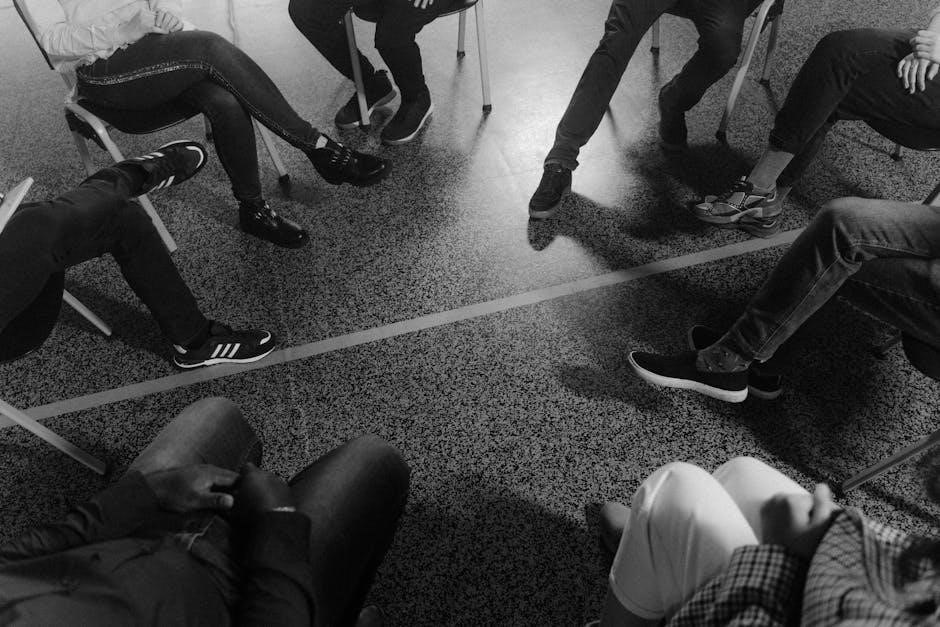Puberty marks the transition from boyhood to manhood, involving physical changes like growth spurts and body development, as well as emotional shifts, guiding boys toward maturity and independence naturally.
What is Puberty?
Puberty is the natural biological process marking the transition from childhood to adulthood. It involves physical, emotional, and hormonal changes, typically occurring between ages 9-14. For boys, puberty begins with testicular growth, followed by increases in height, voice deepening, and the development of body hair. Hormonal shifts, primarily testosterone, drive these changes, preparing the body for sexual maturity. Emotional fluctuations and brain development also occur, shaping identity and decision-making skills. Puberty is essential for growth and sexual development, enabling boys to reach physical and emotional maturity. Understanding these changes is crucial for navigating this transformative phase effectively.
Why is Puberty Important?
Puberty is a critical phase of life, marking the transition from childhood to adulthood. It is essential for physical growth, sexual development, and emotional maturation. During puberty, boys experience significant changes, such as increased height, voice deepening, and the development of secondary sexual characteristics, which prepare them for manhood. These changes are driven by hormonal shifts, particularly testosterone, which play a vital role in building strength, bone density, and muscle mass. Puberty also fosters emotional growth, helping boys develop self-esteem, confidence, and independence. Understanding and navigating this phase is crucial for boys to embrace their transformation and prepare for the responsibilities and opportunities of adulthood, ensuring a healthy and confident transition into manhood.
Physical and Emotional Changes During Puberty
Puberty brings a mix of physical and emotional changes. Physically, boys experience a growth spurt, increased muscle mass, and the development of facial and body hair. Genitalia enlarge, and voice deepens. Emotionally, mood swings emerge due to hormonal fluctuations, and self-esteem may fluctuate. Boys may feel heightened emotions, curiosity about sexuality, and a desire for independence. These changes are natural and temporary, guiding them toward adulthood. Open communication and support help navigate this transformative period, ensuring a smooth transition into manhood with confidence and resilience. Understanding these shifts is key to embracing growth and development during this crucial phase of life.

Physical Changes in Boys During Puberty
Boys experience significant physical changes, including a growth spurt, voice deepening, muscle development, and the appearance of body hair, signaling the onset of puberty and adolescence naturally.
Growth Spurt and Height Increase
During puberty, boys experience a significant growth spurt, with height increasing rapidly due to hormonal changes. This surge typically begins around age 12-14 and lasts 2-3 years. On average, boys grow 3-4 inches annually during this period, but growth rates can vary. Shoes may feel tight as feet grow, and limbs elongate, causing temporary clumsiness. Genetics play a key role in determining final height. Proper nutrition and sleep are crucial to support this growth. While the process can feel overwhelming, it’s a natural part of development, shaping the transition into manhood. Understanding and embracing these changes helps boys navigate this phase confidently.
Voice Deepening and Changes
Voice deepening is a noticeable change during puberty, caused by the growth of the vocal cords and larynx. Boys may experience voice cracking as the voice transitions from high-pitched to deeper tones. This process can be unpredictable, with sudden shifts in pitch. The larynx, or Adam’s apple, also becomes more prominent. While it may feel embarrassing, voice changes are a natural part of development. Patience is key as the voice stabilizes over time, typically within a year or two. Understanding this transformation helps boys embrace their evolving voice with confidence, marking a significant step toward maturity and self-expression.
Development of Body Hair
During puberty, boys begin to grow body hair in various areas, starting with light, fine strands that gradually thicken. Common areas include the underarms, chest, groin, and legs. This development is triggered by hormonal changes, particularly testosterone. The appearance of body hair can vary widely among individuals, with some experiencing more growth than others. It may start as soft, almost invisible fuzz before becoming coarser and darker over time. This process is a natural sign of maturation and typically begins around the same time as other physical changes. While it may feel unusual at first, body hair growth is a normal and healthy part of becoming a man.
Genital Development and Testicular Growth
During puberty, boys experience significant genital development. The testicles grow larger, and the scrotum thins and becomes redder. This growth is one of the first signs of puberty. The penis also increases in size, both in length and width, though the pace varies. Hormonal changes, primarily testosterone, drive these developments. Along with physical growth, boys may notice increased sexual feelings and erections. It’s important to understand that these changes are natural and essential for future fertility and masculinity. Proper hygiene and care for the genital area are crucial during this stage to maintain health and prevent issues. This development is a critical part of transitioning into manhood, preparing the body for potential future responsibilities and roles.

Emotional and Psychological Changes
Puberty brings emotional fluctuations, mood swings, and heightened sensitivity. Boys develop self-esteem, confidence, and begin understanding their feelings, learning to manage stress and navigate social relationships effectively.
Mood Swings and Emotional Fluctuations
During puberty, boys often experience sudden shifts in emotions, leading to mood swings. Hormonal changes, such as increased testosterone, can cause irritability, sadness, or excitement without clear reasons. These fluctuations may be confusing and overwhelming, making it challenging to maintain emotional balance. It’s important to recognize that these changes are normal and temporary. Open communication with trusted adults can help manage these feelings. Understanding and patience are key during this period of significant emotional development, as boys learn to navigate their new emotional landscape and develop coping strategies to handle these intense feelings effectively.
Development of Self-Esteem and Confidence
Puberty is a critical time for building self-esteem and confidence. As boys navigate physical and emotional changes, they often face challenges in self-perception. Encouraging positive self-talk and recognizing personal strengths can help foster a healthy sense of self-worth. Participation in activities they enjoy, whether sports, hobbies, or creative pursuits, can boost confidence and provide a sense of accomplishment. Surrounding themselves with supportive friends and family also plays a key role in developing resilience and self-assurance. Understanding that everyone grows at their own pace can alleviate pressures related to body changes, helping boys embrace their uniqueness and build a positive self-image during this transformative phase.
Understanding and Managing Crushes
Crushes are a common experience during puberty, often leading to feelings of excitement, nervousness, and confusion. It’s important to recognize that these emotions are natural and part of growing up. Managing crushes involves understanding your feelings, being respectful of others, and maintaining healthy boundaries. If you develop a crush, consider how to express your feelings respectfully, whether through honest communication or thoughtful actions. Remember that it’s okay to feel unsure or shy, and it’s crucial to respect the other person’s feelings and decisions. If a crush becomes overwhelming, talking to a trusted friend, family member, or counselor can provide clarity and support. Balancing self-respect with kindness toward others is key to navigating this emotional experience confidently and maturely.

Brain Development During Puberty
During puberty, the brain undergoes significant changes, enhancing decision-making, focus, and emotional regulation, shaping a young man’s ability to think critically and manage complex emotions effectively.
Changes in Decision-Making Skills
During puberty, boys experience significant improvements in decision-making skills. Their brains develop the ability to evaluate choices more critically, weighing risks and consequences. While emotions and peer influence can still impact judgment, the maturing prefrontal cortex enhances logical reasoning. This stage is crucial for learning to balance impulsive decisions with thoughtful consideration. Guidance from parents and mentors can help refine these skills, fostering independence and responsibility. Over time, boys develop better control over their choices, aligning them with long-term goals and personal values. This growth in decision-making is a key aspect of transitioning into young adulthood, preparing them for life’s challenges and opportunities ahead.
Improvements in Focus and Concentration
During puberty, boys often experience improvements in focus and concentration as their brains mature. The prefrontal cortex, responsible for attention and decision-making, develops significantly, enhancing their ability to stay engaged in tasks. While hormonal changes can sometimes lead to distractions, consistent practice and structure help refine these skills. Engaging in activities like sports, hobbies, or academic challenges can further boost concentration. Over time, boys learn to prioritize tasks, manage time more effectively, and maintain focus, which is essential for academic success and personal growth. This improvement in concentration is a key part of cognitive development during puberty, preparing them for future responsibilities and goals.
Understanding and Managing Emotions
During puberty, boys experience a surge of emotions due to hormonal changes, which can feel overwhelming. Learning to recognize and manage these emotions is crucial for emotional well-being. It’s important to understand that mood swings, irritability, and sensitivity are normal as the brain develops. Encourage open conversations about feelings to help process emotions healthily. Techniques like deep breathing, journaling, or talking to trusted individuals can provide relief. Developing emotional intelligence helps boys navigate relationships and challenges more effectively. By understanding their emotions, they can respond thoughtfully rather than react impulsively. This skill is vital for building strong connections and maintaining mental health during and beyond puberty.

Hygiene and Grooming
Proper hygiene and grooming are essential during puberty to maintain health and confidence. Regular showers, using deodorant, and skincare routines help manage body changes and odors effectively daily.
The Importance of Skincare
During puberty, hormonal changes can lead to oily skin and acne, making skincare essential for maintaining healthy and clear skin. Establishing a daily routine with a gentle cleanser and moisturizer helps balance skin texture and reduce breakouts. Using non-comedogenic products prevents clogged pores, while sunscreen protects against UV damage. Consistent skincare not only boosts confidence but also helps manage common teenage skin concerns like pimples and blackheads. Keeping the face clean, especially after sweating or shaving, prevents irritation and infections. Regular exfoliation removes dead skin cells, promoting a fresh and radiant appearance. Prioritizing skincare now sets the foundation for lifelong healthy skin habits and makes navigating puberty more manageable.
Showering and Personal Hygiene
Regular showering is crucial during puberty to manage body odor and prevent skin irritation. Aim to shower daily, using warm water and a mild soap to cleanse the body thoroughly. Pay special attention to areas prone to sweating, such as the underarms, groin, and feet. Washing hair regularly, especially if it’s oily, helps maintain freshness. After showering, dry completely to avoid fungal infections. Trimming nails and cleaning ears are also essential parts of personal hygiene. These habits not only promote cleanliness but also boost confidence and social comfort. Making hygiene a routine helps teenage boys feel fresh and prepared for daily activities, fostering a positive self-image during this transitional phase.
Using Deodorant and Antiperspirant
Using deodorant and antiperspirant becomes essential during puberty as body odor increases due to hormonal changes. Deodorant helps neutralize odors, while antiperspirant reduces sweat. Apply these products in the morning and reapply as needed, especially after physical activity. Choose products that suit your needs and preferences, whether stick, roll-on, or spray. Allow the product to dry before dressing to avoid stains. Remember, consistent use helps maintain freshness and confidence throughout the day. If you’re active in sports or experience excessive sweating, consider stronger formulations. Proper hygiene practices, like showering, complement the effectiveness of these products. This simple routine ensures you stay fresh and comfortable, boosting your self-assurance during puberty.
Nutrition and Exercise
A balanced diet and regular exercise are essential during puberty, providing necessary nutrients for growth and energy while promoting overall physical health and development.
Healthy Eating Habits for Teenage Boys
A balanced diet is crucial during puberty to support rapid growth and energy needs.Teenage boys should focus on nutrient-rich foods, including proteins, vitamins, and minerals. Incorporating lean meats, fish, eggs, and legumes helps build muscle and strength. Whole grains, fruits, and vegetables provide essential vitamins and fiber, promoting overall health. Calcium-rich foods like dairy products are vital for bone development. Staying hydrated with water and limiting sugary drinks is also important. Regular meals help maintain energy levels, while avoiding excessive junk food prevents unhealthy weight gain. A well-rounded diet supports physical and mental development, ensuring boys navigate puberty with optimal health and vitality.
The Role of Exercise in Puberty
Exercise plays a vital role during puberty, supporting physical growth and emotional well-being. Regular physical activity helps build muscle, strengthen bones, and improve coordination. It also aids in managing weight and boosting energy levels. Teenage boys benefit from a mix of strength training, cardio, and flexibility exercises, which promote overall health and development. Exercise can also reduce stress and anxiety, helping teens navigate emotional changes. Aim for at least 60 minutes of moderate to vigorous activity daily, as recommended by health guidelines. Staying active not only enhances physical fitness but also fosters a sense of accomplishment and confidence, making it a key component of a healthy puberty journey.
Importance of Sleep for Growth and Development
Sleep is crucial during puberty, as it directly impacts growth and development. During sleep, the body releases growth hormones that help increase height and develop muscles. Teenage boys need 8-10 hours of quality sleep nightly to support physical changes. Sleep also aids in brain function, improving focus and memory. Lack of sleep can lead to mood swings, fatigue, and difficulty concentrating. Establishing a consistent sleep routine helps regulate the body’s internal clock, ensuring optimal rest. Prioritizing sleep supports overall health, emotional stability, and the ability to handle the challenges of puberty effectively. Making sleep a priority is essential for both physical and mental well-being during this transformative phase.

Social Changes and Relationships
During puberty, boys experience shifts in social dynamics, forming new friendships and navigating peer interactions. Understanding family dynamics and building strong relationships become crucial for emotional support and guidance.
Making New Friends and Social Connections
Making new friends during puberty is crucial for building social skills and emotional support. Boys often form bonds through shared interests, sports, or activities, fostering trust and camaraderie. Engaging in group settings helps develop communication skills and confidence. Encouraging participation in clubs or teams can provide opportunities to meet like-minded peers. Healthy friendships during this phase help navigate emotional changes and reduce feelings of isolation. It’s important to maintain open communication and respect boundaries, ensuring relationships are positive and uplifting. Embracing diversity and being approachable can lead to meaningful connections that last a lifetime. This period is key for forming a strong social foundation.
Dealing with Peer Pressure
Peer pressure is a common challenge during puberty, where boys often feel influenced by friends or peers to fit in or make certain choices. Understanding the impact of peer pressure is key to navigating it effectively. It’s important to recognize when decisions might lead to negative outcomes and to make wise choices. Building self-confidence and staying true to personal values can help resist unhealthy pressures. Surrounding yourself with supportive friends who encourage positive behavior is crucial. Learning to say “no” firmly and seeking advice from trusted adults can provide guidance. Finding the balance between fitting in and staying true to oneself is essential for maintaining integrity and self-respect during these formative years.
Understanding Family Dynamics
Family dynamics play a significant role during puberty, as boys navigate their changing identities and relationships. Open communication with parents and siblings is crucial for building trust and understanding. Parents can offer guidance, while brothers and sisters may provide camaraderie and support. It’s important to respect boundaries while seeking advice from trusted family members. Changes in behavior or emotions may affect family interactions, but maintaining patience and empathy fosters a positive environment. Understanding that family is a vital support system can help boys feel secure during this transition. Encouraging honest conversations and fostering mutual respect strengthens these bonds, helping boys grow into confident individuals within a loving family framework.

Sexual Development and Awareness
Sexual development involves understanding changes in attraction, hygiene, and health. Boys learn about physical transformations and emotional aspects, including masturbation and safe practices during puberty.
Understanding Sexual Attraction
Sexual attraction is a natural part of puberty, involving feelings of interest or crushes toward others. Boys may experience attraction to people of the same or opposite gender, which is normal. Understanding these feelings helps navigate relationships respectfully. It’s important to recognize boundaries and consent, ensuring interactions are comfortable and appropriate for everyone involved. Open conversations with trusted adults can provide guidance and clarity. Managing attraction healthily involves balancing emotions with respect for others’ feelings and boundaries, fostering positive connections and self-awareness during this developmental phase.
Basics of Sexual Health and Safety
Understanding sexual health and safety is crucial during puberty. It involves learning about personal hygiene, consent, and protection from sexually transmitted infections (STIs). Practicing safe behaviors, such as using condoms, is essential to prevent unwanted consequences. Open communication with partners about boundaries and preferences is key to ensuring mutual respect and comfort. Educating oneself about the risks and responsibilities associated with sexual activity is vital. Seeking accurate information from trusted sources, like healthcare providers or reputable websites, helps make informed decisions. Remember, sexual health is not just physical but also emotional, requiring honesty and care in all interactions.
What to Know About Masturbation
Masturbation is a natural and normal part of sexual development during puberty. It is important to understand that exploring one’s body is a common way for boys to learn about their sexuality. Privacy is key, and it should be done in a respectful and appropriate setting. Masturbation is not harmful if done respectfully and without interfering with daily life. It is also important to avoid feeling guilty or ashamed, as it is a normal biological response. Understanding boundaries and ensuring it does not become excessive or obsessive is crucial. Open conversations with trusted adults or healthcare providers can provide clarity and reassurance about this natural aspect of growing up.

Mental Health and Well-being
Mental health is crucial during puberty. Managing stress, anxiety, and emotional changes helps boys maintain well-being. Open conversations about feelings foster resilience and positive growth.
Dealing with Stress and Anxiety
Stress and anxiety are common during puberty due to hormonal changes and societal pressures. Boys may feel overwhelmed by school, friendships, or body changes. Recognizing these feelings is key to managing them effectively. Open conversations with trusted adults or friends can provide relief and perspective. Engaging in physical activities, like sports or exercise, helps reduce stress naturally. Mindfulness practices, such as deep breathing or meditation, can also calm the mind. It’s important to remember that seeking help is a sign of strength, not weakness. If feelings of anxiety persist, talking to a counselor or therapist can offer tailored strategies to cope. Balancing responsibilities and taking time for hobbies can also ease stress and promote well-being.
Recognizing Signs of Depression
Depression during puberty can manifest as persistent sadness, irritability, or a lack of interest in activities once enjoyed. Boys may experience mood swings, withdrawal from friends, or changes in appetite and sleep patterns. It’s important to recognize these signs, as they can sometimes be mistaken for typical teenage behavior. If feelings of hopelessness, low self-esteem, or difficulty concentrating persist, it may indicate depression. Open conversations with trusted adults, such as parents or counselors, can help identify these signs early. Encouraging honest communication and seeking professional support if needed is crucial. Remember, depression is not a sign of weakness, and with the right help, recovery and growth are possible. Acknowledging these feelings is the first step toward healing and finding balance during this transitional phase of life.
The Importance of Talking About Your Feelings
Talking about your feelings is a powerful way to manage emotions and maintain mental well-being. During puberty, boys often face societal pressures to appear strong or stoic, which can discourage open communication. However, bottling up emotions can lead to stress, anxiety, or feelings of isolation. Sharing your thoughts with trusted friends, family, or counselors can provide relief, perspective, and support. It helps build trust and strengthens relationships. Remember, expressing emotions is a sign of strength, not weakness. By being open and honest, you can navigate challenges more effectively and develop healthier coping mechanisms. Don’t hesitate to reach out when you need to talk—your well-being matters, and seeking help is a courageous step toward growth and understanding.
Embrace the journey of puberty with confidence and self-acceptance. Understand that growth, changes, and challenges are natural steps toward maturity. Stay informed, stay confident, and thrive as you grow into manhood.
Embracing the Changes of Puberty
Embracing puberty means accepting the natural transition from boyhood to manhood with confidence and curiosity. It’s a time of significant physical and emotional growth, where boys develop into young men. While changes like body hair, voice deepening, and growth spurts can feel unfamiliar, they are normal and necessary. Emotional shifts, such as mood swings and heightened self-awareness, are also part of the journey. By staying informed and maintaining a positive mindset, boys can navigate these changes with ease. Encourage open conversations about feelings, health, and relationships to foster resilience and self-acceptance. Puberty is not just about physical transformation but also about building character and confidence for the future.
The Journey to Manhood
The journey to manhood is a transformative experience marked by physical, emotional, and psychological growth. It’s a time when boys develop into responsible and confident individuals. Puberty introduces significant changes, such as increased height, deeper voices, and the development of body hair, signaling the onset of manhood. Emotional maturity also evolves, with boys forming stronger connections and understanding their roles in society. Navigating this journey requires resilience, self-awareness, and support from family and friends. By embracing these changes and staying informed, boys can transition smoothly into manhood, ready to face life’s challenges with confidence and determination. This journey is not just about physical growth but also about developing character and wisdom.
Final Tips for Navigating Puberty
Navigating puberty successfully requires a combination of self-care, education, and support. Prioritize hygiene, adopt healthy eating habits, and stay active to fuel your body’s changes. Managing stress through open communication with trusted adults or friends can ease emotional challenges. Embrace your growth, whether it’s physical or emotional, and remember that every experience is a step toward maturity. Seeking answers to your questions and staying informed about sexual health and safety is crucial. Lastly, don’t hesitate to talk about your feelings—sharing your thoughts can provide relief and clarity. By taking these steps, you’ll confidently navigate this transformative phase and emerge as a confident, capable young man.